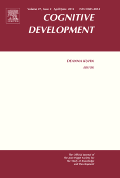
COGNITIVE DEVELOPMENT
metrics 2024
Exploring the Depths of Cognitive Growth
Introduction
Cognitive Development is a prestigious academic journal published by Elsevier Science Inc, focusing on the critical area of developmental and cognitive psychology. With an ISSN of 0885-2014 and an E-ISSN of 1879-226X, this journal serves as a vital platform for the dissemination of innovative research, theories, and methodologies from 1986 to the present, with the latest articles contributing to a comprehensive understanding of cognitive processes in children and adolescents. Positioned in the second quartile (Q2) of both the Developmental and Educational Psychology and Experimental and Cognitive Psychology categories, Cognitive Development holds an essential place in shaping contemporary psychological research, boasting robust Scopus rankings of #175/360 and #90/165 in its respective fields. Though not an open-access journal, it provides valuable insights and rigorous studies essential for researchers, professionals, and students engaged in the intricate processes of cognitive development. Whether you're looking to publish significant findings or simply stay updated on the latest advancements, Cognitive Development is an indispensable resource in the psychological community.
Metrics 2024
 0.84
0.84 1.80
1.80 2.10
2.10 91
91Metrics History
Rank 2024
Scopus
IF (Web Of Science)
JCI (Web Of Science)
Quartile History
Similar Journals
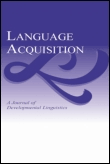
Language Acquisition
Advancing understanding in language development.Language Acquisition, published by ROUTLEDGE JOURNALS, TAYLOR & FRANCIS LTD, is a leading academic journal dedicated to the interdisciplinary study of language development and acquisition. With an ISSN of 1048-9223 and E-ISSN 1532-7817, this peer-reviewed journal caters to professionals, researchers, and graduate students in the fields of linguistics and educational psychology. The journal boasts an impressive 2023 Scopus ranking of Q1 in Linguistics and Language and Q2 in Education, reflecting its high impact and relevance within academic circles. Notably, it is indexed among the top 15% of journals in Language and Linguistics, showcasing its significance in contributing knowledge to these vibrant fields. Although currently not open access, Language Acquisition makes a profound impact on understanding how individuals acquire language, facilitating discussions on pedagogical strategies, cognitive development, and sociolinguistic factors. The journal's historical and ongoing contributions since its inception in 1990 reinforce its position as a vital resource for advancing research and theory related to language acquisition.
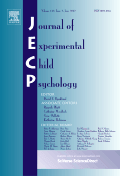
JOURNAL OF EXPERIMENTAL CHILD PSYCHOLOGY
Elevating Educational Practices with Groundbreaking ResearchJOURNAL OF EXPERIMENTAL CHILD PSYCHOLOGY, published by Elsevier Science Inc, stands as a premier outlet for high-quality research in the fields of Developmental and Educational Psychology and Experimental and Cognitive Psychology. With an impressive impact factor and recognized within the Q1 category for both developmental and experimental psychology, this journal is dedicated to advancing our understanding of child psychology through rigorous empirical research and theoretical contributions. Indexed with an ISSN of 0022-0965 and E-ISSN 1096-0457, it is a vital resource for scholars aiming to explore the complexities of children's cognitive, social, and emotional development from 1964 to 2024. Engaging with this journal provides researchers, professionals, and students access to cutting-edge findings that inform practice, policy, and future studies in the ever-evolving landscape of child psychology.

EUROPEAN JOURNAL OF PSYCHOLOGY OF EDUCATION
Shaping the future of education with psychological research.Welcome to the European Journal of Psychology of Education, a leading scholarly publication dedicated to advancing the fields of developmental and educational psychology. Published by Springer, this esteemed journal boasts an impressive impact factor, firmly placing it in the Q1 quartile for both Developmental and Educational Psychology as well as Education as of 2023. With a Scopus rank of #171 out of 1543 in Social Sciences Education and a #63 ranking out of 360 in Psychology, it represents a vital resource for researchers, professionals, and students seeking to explore innovative educational practices and psychological theories from a European perspective. Founded in 1986, the journal has established itself as a cornerstone of contemporary research over the years and continues to publish high-quality articles that contribute significantly to the understanding of psychological principles in educational contexts. Although it does not currently operate under an open access model, its rigorous peer-review process ensures that only the most impactful studies are included, making it essential reading for those committed to advancing educational psychology.

Psycholinguistics
Advancing Understanding at the Intersection of Psychology and Linguistics.Psycholinguistics is a distinguished academic journal published by the STATE HIGHER EDUCATIONAL ESTABLISHMENT in Ukraine, specializing in the intersection of psychology and language. Since its inception, this journal has transitioned to an Open Access model in 2017, offering unrestricted access to its rich repository of research that contributes to the field's understanding of cognitive processes and linguistic functions. With an impressive Q2 classification in Linguistics and Language and a Q4 classification in Experimental and Cognitive Psychology as of 2023, Psycholinguistics garners significant attention among scholars, evidenced by its notable rankings in Scopus. The journal serves as a vital platform for researchers, professionals, and students, enabling the dissemination of innovative findings and theoretical advancements in psycholinguistics. Its commitment to high-quality scholarship and open access makes it a valuable resource for those engaged in the exploration of language acquisition, processing, and cognitive aspects of linguistic behavior.
Address: VUL SUKHOMLYNSKOHO 30, PEREYASLAV-KHMELNYTSKYI 08400, UKRAINE.
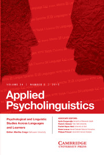
APPLIED PSYCHOLINGUISTICS
Bridging Linguistics and Psychological ScienceApplied Psycholinguistics, published by Cambridge University Press, is a premier journal in the fields of linguistics, psychology, and cognitive science, with a focus on the intersection of language and psychological processes. Since its inception in 1980, the journal has consistently provided a platform for high-quality research, achieving impressive rankings in various categories as of 2023, including Q1 status in Linguistics and Language, and Q1 in Psychology (miscellaneous). With a focus on experimental and cognitive psychology, it fosters the exploration of language acquisition, social communication, and cognitive mechanisms underlying language use. Although it is not available as an Open Access journal, its rigorous peer-review process and impactful articles make it a significant resource for researchers, professionals, and students alike. The journal's commitment to advancing knowledge is evident through its contributions to both theoretical and applied psycholinguistic research. Whether you're a seasoned researcher or a student eager to delve into psycholinguistics, this journal serves as an essential resource for keeping abreast of cutting-edge developments in the discipline.
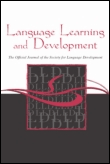
Language Learning and Development
Driving insights in cognitive development and language education.Language Learning and Development, published by Routledge Journals, Taylor & Francis Ltd, is a premier academic journal that stands at the forefront of research in the fields of education and linguistics. With a robust ISSN of 1547-5441 and E-ISSN 1547-3341, this journal not only boasts an impressive Q1 classification in both Education and Linguistics for 2023 but also ranks favorably in Scopus metrics, highlighting its significance in advancing scholarship. Situated in the United Kingdom, it focuses on the intersection of language acquisition, cognitive development, and pedagogical practices, making it an essential resource for researchers, educators, and students alike. Given its commitment to publishing rigorous research articles, Language Learning and Development aims to foster dialogue and explore innovative methodologies in language learning, providing an invaluable platform for contemporary issues and advancements in this dynamic field.
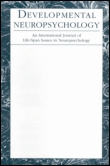
DEVELOPMENTAL NEUROPSYCHOLOGY
Advancing Understanding of Neurodevelopmental JourneysDEVELOPMENTAL NEUROPSYCHOLOGY (ISSN: 8756-5641; E-ISSN: 1532-6942) is a pivotal peer-reviewed journal published by ROUTLEDGE JOURNALS, TAYLOR & FRANCIS LTD in the United Kingdom. Since its inception in 1985, this esteemed journal has been dedicated to advancing the understanding of developmental processes that influence neuropsychological outcomes in children and adolescents. With a focus on the integration of psychological and neuropsychological perspectives, it serves as a vital resource for researchers, clinicians, and educators alike. The journal's current impact factor and its placement in the third quartile for both Developmental and Educational Psychology and Neuropsychology categories underscore its significance in the field, as it ranks in the 45th percentile in both Scopus ranks. While DEVELOPMENTAL NEUROPSYCHOLOGY does not offer open access, it presents crucial research findings and theoretical advancements that cater to professionals seeking to deepen their knowledge and application of developmental neuropsychology until 2024. By fostering dialogue among scholars and practitioners, this journal contributes meaningfully to the ongoing evolution of clinical practices and educational strategies targeting neurodevelopmental trajectories.
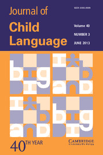
JOURNAL OF CHILD LANGUAGE
Championing Innovative Perspectives on Language DevelopmentJOURNAL OF CHILD LANGUAGE, published by Cambridge University Press, is a premier scholarly journal dedicated to the exploration and examination of language development in children. Since its inception in 1974, the journal has become an authoritative source in the fields of Developmental and Educational Psychology, Experimental and Cognitive Psychology, and Linguistics, boasting significant impact as evidenced by its ranking in the top quartiles across these domains. With an impressive impact factor and a commitment to advancing research, the journal serves as a vital platform for researchers, educators, and practitioners interested in the intricacies of language acquisition and cognitive development in children. The 2023 Category Quartiles place it in Q1 for Linguistics and Language, further establishing its excellence. Fostering a rich intellectual community, the journal invites contributions that advance our understanding of child language, promising a broad readership in both the social sciences and humanities.
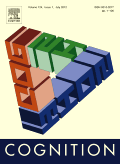
Cognition
Exploring the Depths of Human Thought and LanguageCognition, published by Elsevier, is a leading journal dedicated to the exploration and advancement of knowledge in the multifaceted fields of cognitive neuroscience, cognitive psychology, and linguistics. Since its inception in 1972, this prestigious journal has established itself as a prominent platform for disseminating innovative research and critical reviews, achieving a remarkable Q1 ranking across various relevant categories, including Cognitive Neuroscience and Developmental Psychology, as per the 2023 metrics. With a focus on providing insights that are vital for researchers, professionals, and students alike, Cognition boasts an impressive standing in the academic community, evidenced by its high Scopus rankings which place it in the top percentiles in several disciplines. Researchers interested in the cognitive processes underlying human thought, language, and behavior will find Cognition an invaluable resource that publishes cutting-edge findings and fosters interdisciplinary collaboration. Though it operates under a traditional access model, the breadth and depth of its content ensure it remains integral to advancing cognitive science.
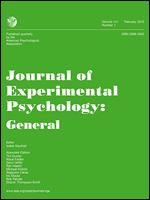
JOURNAL OF EXPERIMENTAL PSYCHOLOGY-GENERAL
Advancing the Frontiers of Psychological ResearchJOURNAL OF EXPERIMENTAL PSYCHOLOGY-GENERAL, published by the American Psychological Association, is a leading journal in the field of experimental and cognitive psychology. With an ISSN of 0096-3445 and a robust impact factor that reflects its significant contribution to research, this journal serves as a premier outlet for empirical studies that advance our understanding of psychological processes across development and cognition. Covering a wide array of topics from developmental neuroscience to general psychology, it is categorized in the Q1 quartile across multiple fields, making it a vital resource for researchers, professionals, and students alike. The journal has maintained a consistent publication record since its inception in 1975, continuously freeing insights that shape the future of psychology and related disciplines. With rigorous peer review and high standards of scholarly excellence, JOURNAL OF EXPERIMENTAL PSYCHOLOGY-GENERAL remains an essential platform for disseminating innovative psychological research.